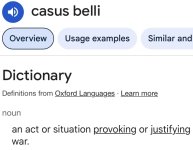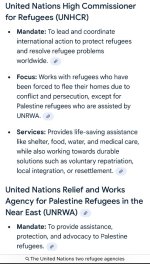You just pulled a (your?) Dixie.Dixie, sorry about the mix-up. That condemnation was for me, the guy who doesn't believe in a sky man.
UNRWA. It's like this...
- Thread starter Retired_Can_Soldier
- Start date
You are using an out of date browser. It may not display this or other websites correctly.
You should upgrade or use an alternative browser.
You should upgrade or use an alternative browser.
No, you're an anti-Semite for your religious condemnation of DA JOOZ! for not signing on to your fairy tale.So now it's true eh, am Im still an "antisemite" for speaking the truth?
Survive what? All the hatred of 13 attacks and land thieving? Yemen is the only country to have ever attack Israel first.
Unprovoked attacks on 12 (14 if you count US and Britain) nations is how you ensure survival?
That makes perfect sense.
PLO activities in Jordan culminated in the Dawson's Field hijackings of 6 September 1970. This involved the Popular Front for the Liberation of Palestine (PFLP) seizing three civilian passenger flights and forcing their landing in the Jordanian city of Zarqa, where they took foreign nationals as hostages and blew up the planes in front of international press. Hussein saw this as the last straw and ordered the Jordanian Army to take action. While the Palestinians in Jordan weren't forced to leave, it was suggested.You just pulled a (your?) Dixie.
I'll dig up some shit about Egypt later, but I guess that it won't matter.
Sky Man denier, out.
Bad news for ya. Its 2025 things have changed.PLO activities in Jordan culminated in the Dawson's Field hijackings of 6 September 1970. This involved the Popular Front for the Liberation of Palestine (PFLP) seizing three civilian passenger flights and forcing their landing in the Jordanian city of Zarqa, where they took foreign nationals as hostages and blew up the planes in front of international press. Hussein saw this as the last straw and ordered the Jordanian Army to take action. While the Palestinians in Jordan weren't forced to leave, it was suggested.
I'll dig up some shit about Egypt later, but I guess that it won't matter.
Sky Man denier, out.
BTW, Ron tried the Egypt angle but quickly found out Egypt was the first to back the Palestinian Declaration of Independence.
Ron explained the Egyptian angle repeatedly through this thread, but it is what it is.Bad news for ya. Its 2025 things have changed.
BTW, Ron tried the Egypt angle but quickly found out Egypt was the first to back the Palestinian Declaration of Independence.
They sure have; the terrorists have become the victims.Bad news for ya. Its 2025 things have changed.
BTW, Ron tried the Egypt angle but quickly found out Egypt was the first to back the Palestinian Declaration of Independence.
Yeah, Zionists get all the attention at the pity party.They sure have; the terrorists have become the victims.
A full-page ad in the Sept. 27 issue of the Globe and Mail, sponsored by the NGO Médecins sans Frontières/Doctors without Borders (MSF), begins with the words, “Doctors can’t stop genocide: World leaders can.” At the end, it asks readers to “stand up for humanity” by signing a linked petition calling on the Canadian government to “uphold international Humanitarian Law.”

 apple.news
In between, the duplicitous ad tots up the many calamities Gazans have endured in the two-year Hamas-Israel war. The ad speaks of civilian hunger, but not of plentiful aid stolen by Hamas. It does not mention Hamas at all — or the hostages taken, or any other casus belli.
apple.news
In between, the duplicitous ad tots up the many calamities Gazans have endured in the two-year Hamas-Israel war. The ad speaks of civilian hunger, but not of plentiful aid stolen by Hamas. It does not mention Hamas at all — or the hostages taken, or any other casus belli.

Amongst other derelictions of professional honour, MSF has not only lied about proven Hamas entrenchment in Gaza hospitals (“we have seen no evidence that the hospital buildings or the compounds are being used by Hamas as a military base”) but admitted — following Oct 7, mind — giving funding to the Hamas-run Gaza Ministry of Health.
The words “non-governmental organization” are a synonym for “civil society.” They are supposed to be made up of altruistic civic-minded groups that provide expertise independent of the narrow self-interest of political bodies. It is on that ground that they are invited to participate in UN activities and speak during UN sessions. (Outside the UN, NGO is a generic term to distinguish non-profits from the business and government sectors.)
But when the upright Cold War era founders of worthy, but now corrupted NGOs like MSF, Human Rights Watch and Amnesty retired, anti-democratic Marxist activists executed the equivalent of a corporate hostile takeover of their organizations.
Apart from their anti-Israel ideology, attacking Israel brought them headlines, money and approval from Islamists. Their new brand failed to attract the scrutiny it deserved. Worse, because of their groups’ original politically neutral respectability, they still enjoy the “halo effect” established by their honourable forebears. Consequently, an equally politicized, incurious media accept their biased “reports” as objective without fact-checking or independent analysis.
Unlike real corporations, the superpower NGOs are accountable to nobody, yet in large part they are setting the UN’s agenda on Israel. Then, when the UN executes the agenda they have promoted, they endorse it as if it were a coincidence that they’re on the same page.

 apple.news
(The rest at the above link)
apple.news
(The rest at the above link)
Terrorists launch rockets at Rafah aid site, no damage reported — The Jerusalem Post
The rockets fell in an area adjacent to the Morag Corridor, in close proximity to the distribution point, but the site was undamaged by the attack.

- an act or situation provoking or justifyingwar.
And hanging overall the false accusation that it is Israel that is committing genocide. Genocide requires intent, demonstrably not the case in Israel’s defensive war, but which perfectly describes the motivation behind Hamas’s rabid pogrom on October 7.
Amongst other derelictions of professional honour, MSF has not only lied about proven Hamas entrenchment in Gaza hospitals (“we have seen no evidence that the hospital buildings or the compounds are being used by Hamas as a military base”) but admitted — following Oct 7, mind — giving funding to the Hamas-run Gaza Ministry of Health.
The words “non-governmental organization” are a synonym for “civil society.” They are supposed to be made up of altruistic civic-minded groups that provide expertise independent of the narrow self-interest of political bodies. It is on that ground that they are invited to participate in UN activities and speak during UN sessions. (Outside the UN, NGO is a generic term to distinguish non-profits from the business and government sectors.)
But when the upright Cold War era founders of worthy, but now corrupted NGOs like MSF, Human Rights Watch and Amnesty retired, anti-democratic Marxist activists executed the equivalent of a corporate hostile takeover of their organizations.
Apart from their anti-Israel ideology, attacking Israel brought them headlines, money and approval from Islamists. Their new brand failed to attract the scrutiny it deserved. Worse, because of their groups’ original politically neutral respectability, they still enjoy the “halo effect” established by their honourable forebears. Consequently, an equally politicized, incurious media accept their biased “reports” as objective without fact-checking or independent analysis.
Unlike real corporations, the superpower NGOs are accountable to nobody, yet in large part they are setting the UN’s agenda on Israel. Then, when the UN executes the agenda they have promoted, they endorse it as if it were a coincidence that they’re on the same page.
Barbara Kay: How disgraceful anti-Israel NGOs set UN agenda — National Post
Hint: it is all about the money
War is between nation-states or self-proclaimed nation-states. Israeli propaganda aside, its war is against Gaza, not Ham-ass.
Just like our war was against Germany, not the People's Workers' Farmers' Laborers' Dole-rats National Socialist Peaceloving Blah Blah Blah Party.
Just like our war was against Germany, not the People's Workers' Farmers' Laborers' Dole-rats National Socialist Peaceloving Blah Blah Blah Party.
Ok. If peace happens to break out in the Middle East in this current goat rodeo, and this Trump peace plan (or pieces of Trumps peace plan?) comes to fruition, and Palestinian is a thing that’s now a state, with borders somewhere, and governed by a someone, etc…what’s next for UNRWA?
I’m not even talking about the whole genocidal radicalization of the last five or so generations of what will be Palestinians, though that’s definitely gotta be taken into account.
I’m talking about Palestinian refugees, that UNRWA & only UNRWA addresses, no longer being refugees because they have a state. What will be UNRWA’s role going forward (?) or will it even have one?
Does UNRWA get the euthanasia it’s so justly deserves, and the UN goes back to having one agency being UNHCR for all refugees?

?????
I’m not even talking about the whole genocidal radicalization of the last five or so generations of what will be Palestinians, though that’s definitely gotta be taken into account.
I’m talking about Palestinian refugees, that UNRWA & only UNRWA addresses, no longer being refugees because they have a state. What will be UNRWA’s role going forward (?) or will it even have one?
Does UNRWA get the euthanasia it’s so justly deserves, and the UN goes back to having one agency being UNHCR for all refugees?

?????
Orphans and child amputees are next.Ok. If peace happens to break out in the Middle East in this current goat rodeo, and this Trump peace plan (or pieces of Trumps peace plan?) comes to fruition, and Palestinian is a thing that’s now a state, with borders somewhere, and governed by a someone, etc…what’s next for UNRWA?
I’m not even talking about the whole genocidal radicalization of the last five or so generations of what will be Palestinians, though that’s definitely gotta be taken into account.
I’m talking about Palestinian refugees, that UNRWA & only UNRWA addresses, no longer being refugees because they have a state. What will be UNRWA’s role going forward (?) or will it even have one?
Does UNRWA get the euthanasia it’s so justly deserves, and the UN goes back to having one agency being UNHCR for all refugees?
View attachment 31545
?????
For extended resources. Shit like legs, arms, housing, rehabilitation, glass eyes, etc. The usual shit when children are attacked with 1 tonne bombs and as target practice.For?
So things that UNHCR is unqualified or too incompetent to provide for then, like they do for the rest of the planet?For extended resources. Shit like legs, arms, housing, rehabilitation, glass eyes, etc. The usual shit when children are attacked with 1 tonne bombs and as target practice.
They can't stroll down the hallway to unicef to collaborate?So things that UNHCR is unqualified or too incompetent to provide for then, like they do for the rest of the planet?
You still believe the hasbara do ya?
Excuse me? You still think the entire world can “make do” with UNHCR, except Palestinians for the last 3/4’s of a century and into the perpetual future needing their own separateThey can't stroll down the hallway to unicef to collaborate?
You still believe the hasbara do ya?
Answer this. Why didn't Israel provide proof of UNRWA shenanigans? What stopped/is stopping them?Excuse me? You still think the entire world can “make do” with UNHCR, except Palestinians for the last 3/4’s of a century and into the perpetual future needing their own separateUNHCR, I mean UNRWA?
To whom? The unbiased & impartial UN who’s already investigated themselves…I mean UNRWA & found them only “partially” guilty, but not guilty enough?Answer this. Why didn't Israel provide proof of UNRWA shenanigans? What stopped/is stopping them?
Perhaps to have the UN arrange another independent investigation of itself by itself and hope for a different outcome this time?
To some other UN based entity? To the media? To Team America World Police? Over the last two years and previous to that, Israel has provided proof of UNRWA shenanigans and to what end? What difference did it make?
13,000 UNRWA employees in Gaza alone and nobody know about the 500kms of tunnels ant-hilling the place with entrances in schools and hospitals and day cares and so on and so forth, tapped into the power and internet of the buildings above them, and nobody knew nothing?
Maybe it’s just another coincidence, etc…
Allegations of ties between the United Nations Relief and Works Agency for Palestine Refugees in the Near East (UNRWA) and Hamas, the militant group that governs Gaza, have been a flashpoint in the Israeli-Palestinian conflict, particularly since the October 7, 2023, Hamas-led attack on Israel. These claims range from individual staff involvement in violence to broader assertions of systemic infiltration, with evidence presented primarily by Israel but contested by UNRWA, independent reviews, and Palestinian advocates. While there is documented evidence of some operational overlaps and misuse of UNRWA facilities by Hamas, no conclusive proof has emerged of institutional collusion at the organizational level, and many broad claims remain unsubstantiated due to a lack of shared intelligence.To whom? The unbiased & impartial UN who’s already investigated themselves…I mean UNRWA & found them only “partially” guilty, but not guilty enough?
Perhaps to have the UN arrange another independent investigation of itself by itself and hope for a different outcome this time?
To some other UN based entity? To the media? To Team America World Police? Over the last two years and previous to that, Israel has provided proof of UNRWA shenanigans and to what end? What difference did it make?
13,000 UNRWA employees in Gaza alone and nobody know about the 500kms of tunnels ant-hilling the place with entrances in schools and hospitals and day cares and so on and so forth, tapped into the power and internet of the buildings above them, and nobody knew nothing?
Maybe it’s just another coincidence, etc…
Evidence of Specific Ties
Israel has publicly detailed instances where UNRWA staff or infrastructure intersected with Hamas activities. For example, Israeli intelligence identified at least 12 UNRWA employees as participants in the October 7 attack, including six who crossed into Israel, two who held hostages, and others who transported weapons or ammunition. The Israel Defense Forces (IDF) also uncovered Hamas tunnels, weapons caches, and firing positions embedded in or under UNRWA schools and headquarters in Gaza, including a sophisticated data center beneath UNRWA's Gaza HQ connected to the agency's electricity grid. UNRWA-labeled aid bags and concrete have been found in Hamas tunnels and hideouts, such as one used by Hamas leader Yahya Sinwar. In July 2024, Israel provided UNRWA with a list of 100 alleged militant members among its staff, though no follow-up evidence was shared publicly.
A separate U.S. Agency for International Development (USAID) investigation in April 2025 corroborated some links, finding evidence tying three current or former UNRWA employees to the October 7 attacks and 14 others to militant affiliations. Critics like UN Watch, which has monitored UNRWA for years, argue these incidents reveal a "unholy alliance," with Hamas exploiting UNRWA's vast Gaza operations—employing about 13,000 locals, many of whom are also aid recipients—since taking control in 2007.
UNRWA and UN Responses
UNRWA has consistently rejected claims of widespread infiltration, emphasizing that "allegations are not evidence" and calling for formal investigations into any misuse of its facilities. In response to the October 7 allegations, the UN's Office of Internal Oversight Services (OIOS) investigated 19 staff members: nine were terminated for possible involvement (e.g., transporting hostages or ammunition), while evidence was insufficient or absent in the other 10 cases. UNRWA shares annual staff lists with Israel and host authorities, including Palestinian ID numbers since March 2024, but claims it has received no supporting intelligence for broader accusations like 1,200 Gaza staff (about 10%) having Hamas links—a figure cited in Israeli media but not backed by public proof.
An independent review led by former French Foreign Minister Catherine Colonna, released in April 2024, found UNRWA's neutrality mechanisms "robust" overall but recommended enhancements like better vetting and risk assessments in high-conflict areas. Crucially, it stated Israel had not provided evidence for claims of significant staff membership in Hamas or Palestinian Islamic Jihad (PIJ), nor for institutional complicity. The UN has since resumed most funding to UNRWA after these probes, though countries like the U.S. imposed temporary halts.
Palestinian and Broader Perspectives
From a Palestinian viewpoint, Israel's accusations are seen as a pretext to dismantle UNRWA, which provides essential education, health, and relief services to over 5 million refugees—framing it as a "barrier" to permanent solutions like mass displacement or annexation. Al Jazeera reports describe the defunding push as "worse than collective punishment," arguing it exacerbates Gaza's humanitarian crisis without addressing root causes like occupation. Skepticism of Israel's "dossier" on UNRWA staff persists, with outlets noting unverified claims and a pattern of media amplification without proof. Recent X discussions echo this divide, with users criticizing UNRWA as "Hamas-infiltrated" in the context of hostage releases and aid, while others defend it as vital amid alleged Israeli overreach.3987586f0e24
Assessment
There are substantiated ties at the individual and tactical levels—e.g., rogue staff actions and Hamas's opportunistic use of UNRWA sites for cover, which violates international humanitarian law. However, independent probes, including the Colonna report and OIOS findings, conclude no evidence supports Israel's narrative of UNRWA as a "terrorist front" or deeply infiltrated entity. Israel maintains these ties are structural and "impossible to disentangle" from Hamas's rule in Gaza, but its reluctance to share raw intelligence limits verification. As of October 2025, UNRWA continues operations under scrutiny, with ongoing calls for transparency from all sides. The debate underscores deeper geopolitical tensions: for Israel, UNRWA perpetuates the conflict; for Palestinians, it's a lifeline under siege.
